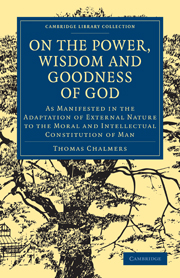 On the Power, Wisdom and Goodness of God
On the Power, Wisdom and Goodness of God Book contents
- Frontmatter
- Dedication
- NOTICE
- Contents
- PREFACE
- INTRODUCTORY CHAPTER
- PART I ON THE ADAPTATION OF EXTERNAL NATURE TO THE MORAL CONSTITUTION OF MAN
- CHAP. I FIRST GENERAL ARGUMENT
- CHAP. II SECOND GENERAL ARGUMENT
- CHAP. III THIRD GENERAL ARGUMENT
- CHAP. IV On the General Adaptation of External Nature to the Moral Constitution of Man
- CHAP. V On the Special and Subordinate Adaptations of External Nature to the Moral Constitution of Man
CHAP. V - On the Special and Subordinate Adaptations of External Nature to the Moral Constitution of Man
Published online by Cambridge University Press: 29 August 2010
- Frontmatter
- Dedication
- NOTICE
- Contents
- PREFACE
- INTRODUCTORY CHAPTER
- PART I ON THE ADAPTATION OF EXTERNAL NATURE TO THE MORAL CONSTITUTION OF MAN
- CHAP. I FIRST GENERAL ARGUMENT
- CHAP. II SECOND GENERAL ARGUMENT
- CHAP. III THIRD GENERAL ARGUMENT
- CHAP. IV On the General Adaptation of External Nature to the Moral Constitution of Man
- CHAP. V On the Special and Subordinate Adaptations of External Nature to the Moral Constitution of Man
Summary
1. We have hitherto confined our attention to certain great and simple phenomena of our moral nature, which, though affording a different sort of evidence for the being of God from the organic and complicated structures of the material world—yet, on the hypothesis of an existent Deity, are abundantly decisive of His preference for virtue over vice, and so of the righteousness of His own character. That he should have inserted a great master faculty in every human bosom, all whose decisions are on the side of justice, benevolence, and truth, and condemnatory of their opposites; that He should have invested this conscience with such powers of instant retribution, in the triumphs of that complacency wherewith He so promptly rewards the good, and the horrors of that remorse wherewith He as promptly chastises the evil; that beside these, He should have so distinguished between virtue and vice, as that the emotions and exercises of the former should all be pleasurable, and of the latter painful to the taste of the inner man; that He should have so ordained the human constitution, as that by the law of habit, virtuous and vicious lives, or series of acts having these respective moral qualities, should issue in the fixed and permanent results of virtuous and vicious characters—these form the important generalities of our moral nature: And while they obviously and immediately announce to us a present demonstration in favour of virtue; they seem to indicate a preparation and progress towards a state of things; when, after that the moral education of the present life has been consummated, the great Ruler of men will manifest the eternal distinction which he puts between the good and the evil.
- Type
- Chapter
- Information
- On the Power, Wisdom and Goodness of GodAs Manifested in the Adaptation of External Nature to the Moral and Intellectual Constitution of Man, pp. 187 - 217Publisher: Cambridge University PressPrint publication year: 2009First published in: 1834


